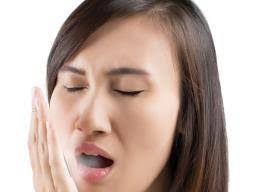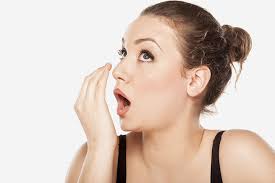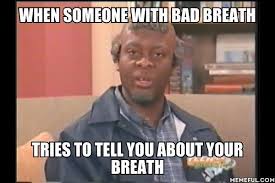Occasional bad breath is common, but what if you or someone you know suffers from chronic halitosis? What are the causes and what can you do about it? Dr. Chuck answers these questions in this episode.
Today we’re talking about a sensitive topic, it’s about bad breath. How do you know if you have it? And doesn’t using mouthwash fix it?
Well, it all depends on what the goal is. Are you trying to mask the breath, or are you trying to take care of it?
Oh, that’s a good opening. First of all, how do you know if you have it?

Well, sometimes it’s hard for a person to know if they have bad breath or not. It’s like a smoker. They don’t smell the smoke. And sometimes someone with bad breath, halitosis, doesn’t realize they have it. Well that’s one thing you can do, is use mouth wash. But another thing you can do is lick your wrist, let it dry, and then smell it. Or you can ask someone you love, who’s going, to be honest with you. And sometimes people have a hard time being honest with you because they don’t want to offend you, but you’d much rather know if you did or didn’t.
Yeah, absolutely. So you lick your wrist, wait, and see if it smells. What about sneezes? Sometimes when somebody sneezes, you can smell it.
Exactly. So what’s coming out of you? Does it smell good? Does it smell bad? And sometimes, again, you may have to ask people that you love, that care about you. Do you have it or don’t you have it?
Wow. So what causes it?
There’s a lot of different causes for bad breath. The number on reason, though, is oral infections. Bad home care, not brushing good, not flossing good, not keeping the mouth as clean as it should be. That’s the thing right there. I know my soapbox is really on what’s going on behind the curtain of the lips, and there’s so much that’s going on that you just don’t see. And if you don’t see it, you’re not going to pay attention to it. If you had a wound, you’d want to clean it up. Let it get healthy, and it would go away. If you don’t see it, it’s still is going on and now you’ve got the pus, the other stuff coming out and you wonder why you have bad breath.
Sure. That makes a lot of sense.
Yeah, it’s coming right out of the mouth. But that’s one of the causes for it. There’s a lot of other possible causes that you have for it. We have a whole list right here. For example, tobacco. That’s a list for some people. It masks the bleeding of gum disease, but it’s really bad for overall oral health. Smoking is a bad thing.
So it’s not just bad breath because of the tobacco or the cigarette smoke, it’s encouraging bacteria, which is the bad breath.
You’ve got more gum disease going on, then you have more bacteria. So it just keeps on getting worse. Certain foods that you eat. You know if you have onion and garlic. And also like that, that can affect your breath. Let’s talk about dry mouth.
Dry mouth, why?

Well, you don’t have the saliva to dilute the acids that the bacteria are producing. Now you got this kind of a cakey build up in here and the saliva isn’t there to flush things out, to keep things clean. There’s around 400 medications that will dry out your mouth, so this is a common thing. So dry mouth is not a fun thing, but a side effect of dry mouth is bad breath.
Oh wow. Okay.
Dental hygiene. Now the first thing we talked about, take care of your teeth. Keep them good and clean. People talk about brush your teeth, brush your teeth, brush your teeth. No, no, no, no. Clean your teeth, clean your teeth.
That’s a bit different than just brushing.
But we have to get in between the teeth. Whether you use dental floss or those little picks or water irrigation. There’s more than one right way, but there’s a lot of wrong ways, too, so you’ve got to clean your teeth. Another thing for bad breath, crash diets. Okay? You get on this diet, you’re going to lose a lot of weight in a hurry. Well, that can affect the way your body is metabolizing food. You can go into ketosis. And people on the keto diet, which is… I’m not going to knock it, but you can get into ketosis, which can give you bad breath. So sometimes you think, gee, am I not cleaning my teeth good enough? No, let’s look at the diet that you’re on. That can be a factor in it. And certain drugs can affect your breath. They come out in the breath. Of course, we already talked about some drugs that can dry out your mouth. So there’s a whole lot of issues with dry mouth and the effects of other drugs, too. The mouth, nose and throat conditions. If you’ve ever seen anybody that has had tonsil stones. Those are those little white stones that get in the tonsils, way back there. Some people have them, other people never have seen them. Well the people that have them know about them. A lot of times they can smell.
Very interesting!
And so you’re breathing out. So again, cleaning out those tonsil stones. That would be another thing you can do. Foreign bodies. Some people will aspirate certain things, and that can give you bad breath, too. So there’s a lot of different things, but the number one thing? Just keeping a clean mouth. A good clean healthy mouth.
That’s where we were going. What do you do about it? So, of all those things that you listed so far, the number one is just keeping a clean mouth.
Absolutely! A lot of people will pull out the mouth rinse and say, “This will take care of my breath.” Well, you’re masking it. You’re covering it, are we getting to the source. And what we want to do, is to get to the source of the bad breath, not just cover it over with a bandaid.
So this mouthwash says it says it kills germs that cause bad breath, plaque, gum disease, gingivitis. Like Listerine, is that killing the bacteria?
It can be one of the steps involved in getting a healthy mouth, but it’s not the end all. A lot of times people think, “I’ll just swish with this and that will take care of it.” No. It takes a little bit more than that. You have to get in there and what I recommend is five to seven minutes one time a day. You’ve got to get in there. You can’t do it in 30 seconds. So when you’re cleaning your teeth, take that time. That’s going to help your breath. So what are some of the things you can do? We already talked about it. Brush your teeth. That’s good. Floss. Get in between your teeth. Get the bacteria out. If you’ve got dentures or partials, you can build up tartar, plaque, calculus on the dentures or partial. It smells. You can get it off. A real easy thing to get it off with is to soak your partial or your denture in white vinegar for about a half an hour.
White vinegar is the key to everything. If you’ve got a stain, white vinegar. If you’ve got a dent in your car, just throw some white vinegar on it.
It might work. It just might work. But you can put that in and it’s safe to do it. You don’t want to leave it in overnight, but just about a half an hour and then take a brush and all of it comes right off. It’s easy. What I like for patients to brush their dentures and partials, Cascade automatic dishwasher soap. The liquid. Squirt some on there, brush it, look at it, make sure it’s clean, put it in water overnight and you’re all set. It’s a fraction of the cost of some of the other things and it works just great. I had a lady one time, it worked so well on her partials, she called me up and said, “Doctor, it worked great on my partials, so I used it in my mouth.” I said, “You used the Cascade on your teeth?” She goes, “Yeah. Now my mouth is on fire.” I said, “Don’t use it. That’s not what it’s made for. You’ve got to read the label.”

That’s the overachieving patients, do they just drive you crazy?
She got better, and things were fine. But it does work well.
Yeah, that would be a poison that you’re putting into your mouth. You know the interesting thing is that of all the things that you listed there, none of them said extensive dentistry is needed. These are all pretty easy fixes and cleansings.
Well, the healthy mouth is the goal that we want to have, and if you do have some issues going on, you want to get those taken care of. But you don’t need a Hollywood smile to have a healthy mouth. But you need a healthy mouth to have a healthy heart. And so when we’re looking at this it goes way beyond bad breath. That’s just a symptom. In fact, for nurses, if they’ve got a patient that has really bad breath, rather than walking away from that patient, it would be good to go up to that patient and find out what’s going on because it is there. Is the health of their mouth affecting their overall health? And there’s a very good chance that it is. And unless we’re looking, we have no idea.
Question of the Week
This is Tracy. What is tooth sensitivity, and why do I have it?
It’s very common. There’s a lot of different things that can cause sensitivity. One thing is the bite. If you have a stone in your shoe and you walk around for a few days, your foot is going to be sore. If your bite is off just a little bit, if that tooth is getting bumped the wrong way, that can make that tooth sore. It can make it sensitive to where you put something hot or cold on it, that’s sensitive. And all it is is the bite. But you have to find that. You have to be able to find where is that bite on that. But that’s one thing is the occlusion, the bite.
You would say that’s the number one thing, though?
No, not necessarily. But I’m going to say it’s pretty high on the list. There are people that, I hate to say it, but they’re sometimes having root canals done on teeth that it was a bite issue. If they would have just taken care of the bite.
Oh, that’s heartbreaking. Not just because of the pain, but the money.
Well, and from the dental side, I’d rather keep that tooth good and healthy with the blood supply going to it, rather than removing that. Nobody wants pain. So the reason you have the root canal done is so you can get rid of the pain. Well, let’s find out why do you have the pain. If it was caused by the bite and you can eliminate the bite and the pain goes away and the tooth is healthy, that to me is a better result than doing the root canal. With both of them, you’re going to be comfortable, but with one of them is going to cost you a little bit more and the tooth is going to be a little bit weaker. So I’m not saying that all root canals are caused by bites, by any means. But you need to be aware that that is a factor on that.
Okay. Other reasons for tooth sensitivity?
A lot of times some of the toothpaste. The whitening and the tartar control toothpaste. The tooth is put together this way. We have, especially on the root, we have microtubules. They transmit nutrients through the tooth from the inside to the outside. Well on the outside of the tooth, those microtubules are supposed to be clogged up. Some of the whitening or the tartar control toothpaste have chemicals that unclog those tubules, so it makes it more sensitive.
You have to choose.
But if we can then use a different type of toothpaste, the sensitivity type toothpaste, they have chemicals that re-clog those tubules on the end. It may take two or three weeks of using it, but you can eventually re-clog those tubules. Now, if you keep alternating between the whitening toothpaste and the sensitivity toothpaste, you’re never going to get there. It’s always going to be sensitive. So what are you trying to achieve here? So you want to continue using the sensitivity type toothpaste. It may take a few weeks, but that sensitivity should be going away if that’s what was causing it in the first place. Now, if you have a leaky filling, if you have a cavity going around an existing restoration, you could get sensitivity from that. So other things can cause the sensitivity, but high on the list is the toothpaste that you’re using. Also, the bite, the way that’s coming. And the last thing I would say would have to be just decay going on the tooth. And if there is, get it taken care of. It’s only going to get worse.
Well, today we’re talking about bad breath, and how you know you have it and what you can do about it. What are the three takeaways?
Well, number one, let’s figure out if you have it or not. So, if you think you do, ask someone close with you. The second thing would be to fix it. And that generally comes from good home care. That’s the biggest thing we have right there. Spend that five to seven minutes getting in there cleaning your mouth. Rather than, say, brushing your teeth or cleaning your teeth, let’s think about cleaning a wound because that’s really what it is. How would you clean a wound on your leg? Well, this is a wound behind the curtain of your lips, so you don’t see it. So let’s clean the wound on that.
How can you fix it?
Get a diagnosis. See what’s going on. If you do have some medical issues going on that could be causing it, find out. If you are diabetic, find out. Go ahead and get some of these tests and get some answers. But don’t be afraid to do what you can do for yourself at home for free. It’s so easy to focus on what we can’t do. But I want to focus on what we can do because what we can do is inexpensive and very effective.

Are we brave enough to ask our spouses and our partners and our loved ones and our children, “Do I have bad breath?
Well, I think it’s worth asking. And if you want to know, ask a kid. They’re going, to be honest with you. Right?
-Yeah. Plus you have a mustache, mom. Thanks. Wasn’t asking about that. But seriously, share what you learn here, this stuff is important!
I’m not the expert. I’m not the researcher. But we need to connect the dots. We need to understand just how important this is, not just for our breath, but for our whole bodies.
